Doing away with cables—or at least, the minimization of them—has been one of the best advances in modern earbuds. Another is good active noise cancelling, which makes wireless earbuds incredibly useful for noisy situations like an open-air office or travel.
Apple’s AirPods are probably the best known set of wireless earbuds, but plenty of other great pairs exist, too. It can make deciding on a set harder, especially since wireless earbuds vary widely on price and capabilities. Some might be better for audiophiles, while others are more suitable for active sports.
Our picks for best wireless earbuds cover all the bases, so you can easily find a pair that meets your particular needs. And if you’re looking for more help on how to choose wireless earbuds, read our guide that follows our top recommendations.
Updated 2/10/23 with the answers to several frequently asked questions about wireless earbuds.
1. Jabra 85t – Best all-around wireless earbuds
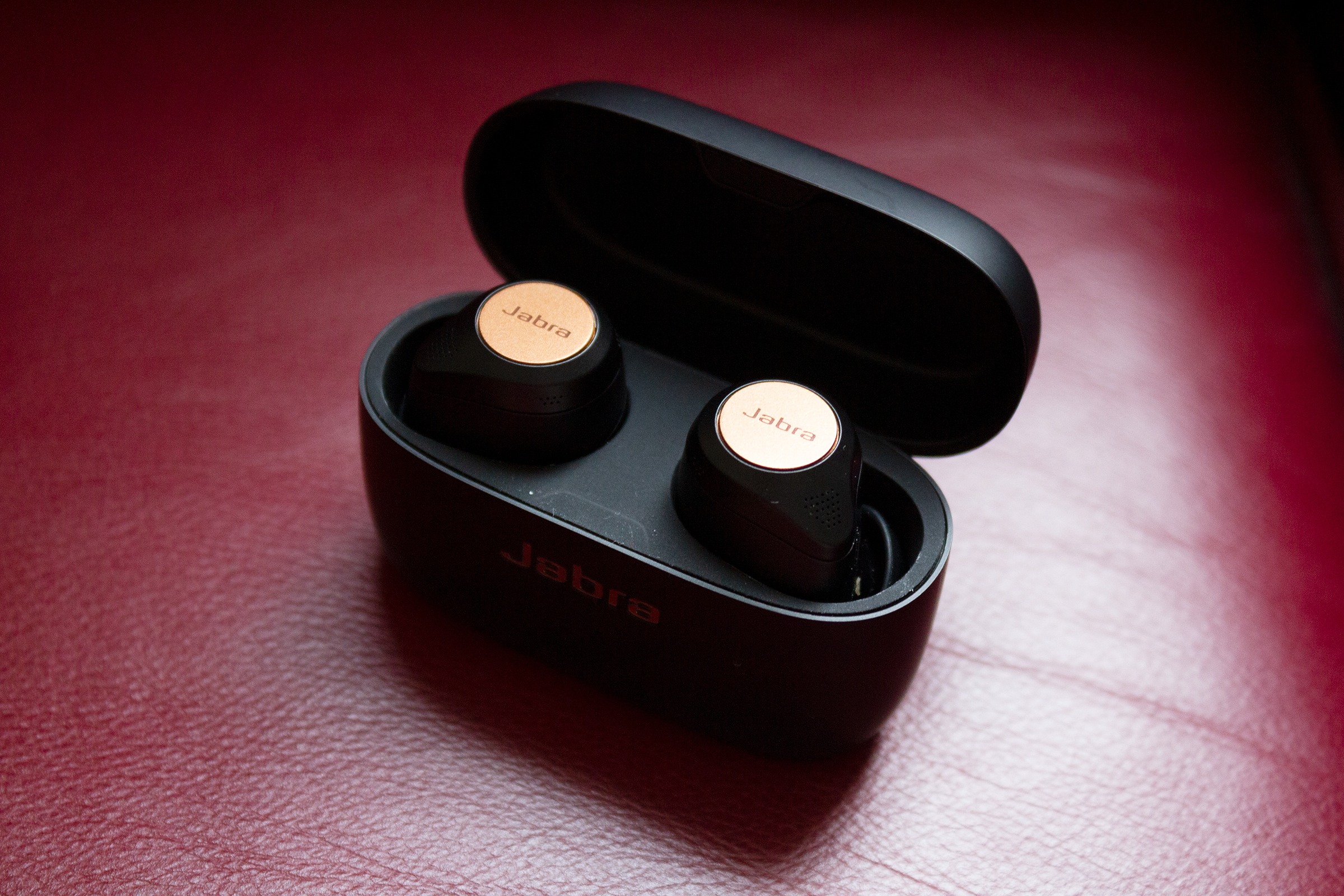
Pros
- Strong active noise canceling
- Clean, neutral sound
- Easy EQ customization
- Highly portable case
- Physical control buttons
Cons
- Less battery life than rival buds
- Overcompressed microphone output
- Fit skews toward smaller ears
People with smaller frames will find the Jabra 85t an extremely compelling set of true wireless earbuds—this set blends excellent sound and superb active noise-canceling in a compact package, while fitting very snugly in your ears.
The Jabra 85t also sports physical buttons for controls, making them far less prone to accidental input. Moreover, these buds are highly customizable across the board. If you make lots of phone calls or need a bit of battery life, other earbuds may be a better match, but otherwise, this set is a great choice.
2. Apple AirPods Pro – Best for iPhone users

Pros
- Excellent fit and comfort
- Compact wireless charging case
- Good active noise reduction
Cons
- Sound quality is a little bland for the price
- Battery life is just okay
You don’t buy AirPods (or AirPods Pro) because they deliver the ultimate listening experience. You buy them because they sound good, provide good active noise cancellation, and are super easy to connect to all your Apple gear. Oh, and they’re compact, work hands-free with Siri, and are incredibly comfortable.
It’s not difficult to find wireless earbuds that do one or two things better than the AirPods Pro, but for users of Apple products, it’s really hard to find earbuds that do so many things so right.
The AirPods Pro live at the sweet spot of comfort, ease of use, features, and sound quality.
3. Apple Powerbeats Pro – Best for iPhone users runner-up

Pros
- Good sound quality
- Comfortable fit
- Epic battery life
Cons
- Pricey
- Case is too big for your pocket
The Powerbeats Pro are Beats’ first true wireless earbuds, and they neatly package up the AirPod experience for an active lifestyle. With the same H1 chip as in second-gen AirPods, these buds provide the same pairing and syncing experience, as well as hands-free “Hey, Siri” capabilities—all while sporting a design similar to Powerbeats 3, only slightly smaller and lighter.
Sound quality is quite good, as is battery life—better than AirPods, thanks to the rubberized tips that fit snug in your ears. The Powerbeats Pro offer better bass response than AirPods, too, without going overboard as other Beats gear does. They’re also splash and sweat proof, and stay put in your ears through all sorts of rigorous physical activity.
4. Bose QuietComfort Earbuds – Best for active noise cancelling
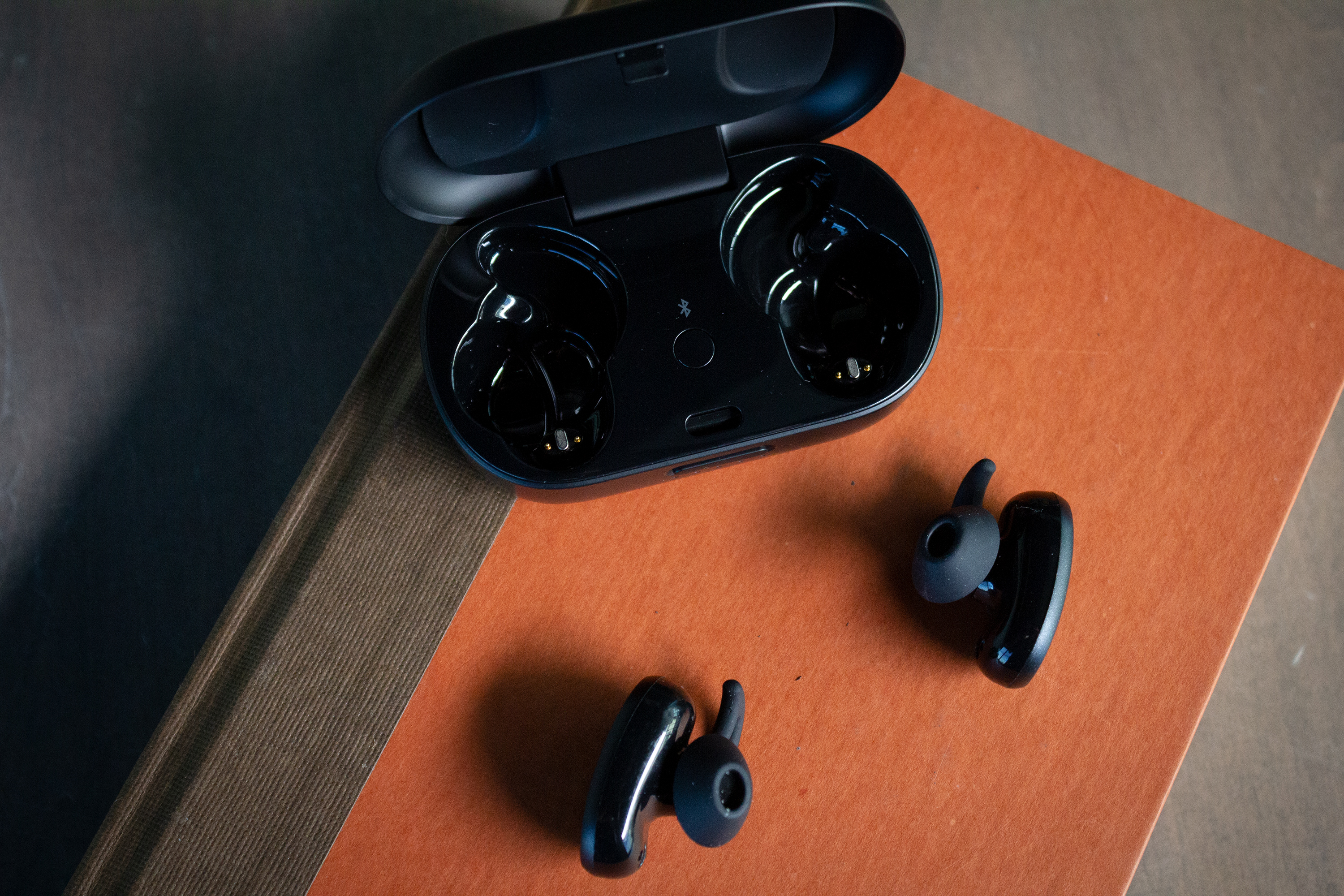
Pros
- Superb active noise canceling
- Extremely clean, neutral sound
- Good touch controls
- Straightforward EQ customization
- Easy to use companion app
Cons
- Huge charging case
- Less battery life than advertised
- Just one customizable touch input
Looking for true wireless earbuds with the best active noise-cancelling? The Bose QuietComfort Earbuds are what you seek. Noisy environments fade into the background with these in-ear. You also get superb audio for music playback that provides good separation between different elements. If you prefer neutral sound profiles, you’ll love these buds.
Their primary weakness is size—both the earbuds and the charging case are large, and the latter doesn’t comfortably fit into pockets. But if you can live with that sacrifice, you’ll enjoy these stellar buds.
5. Master & Dynamic MW07 Plus – Best for audiophiles
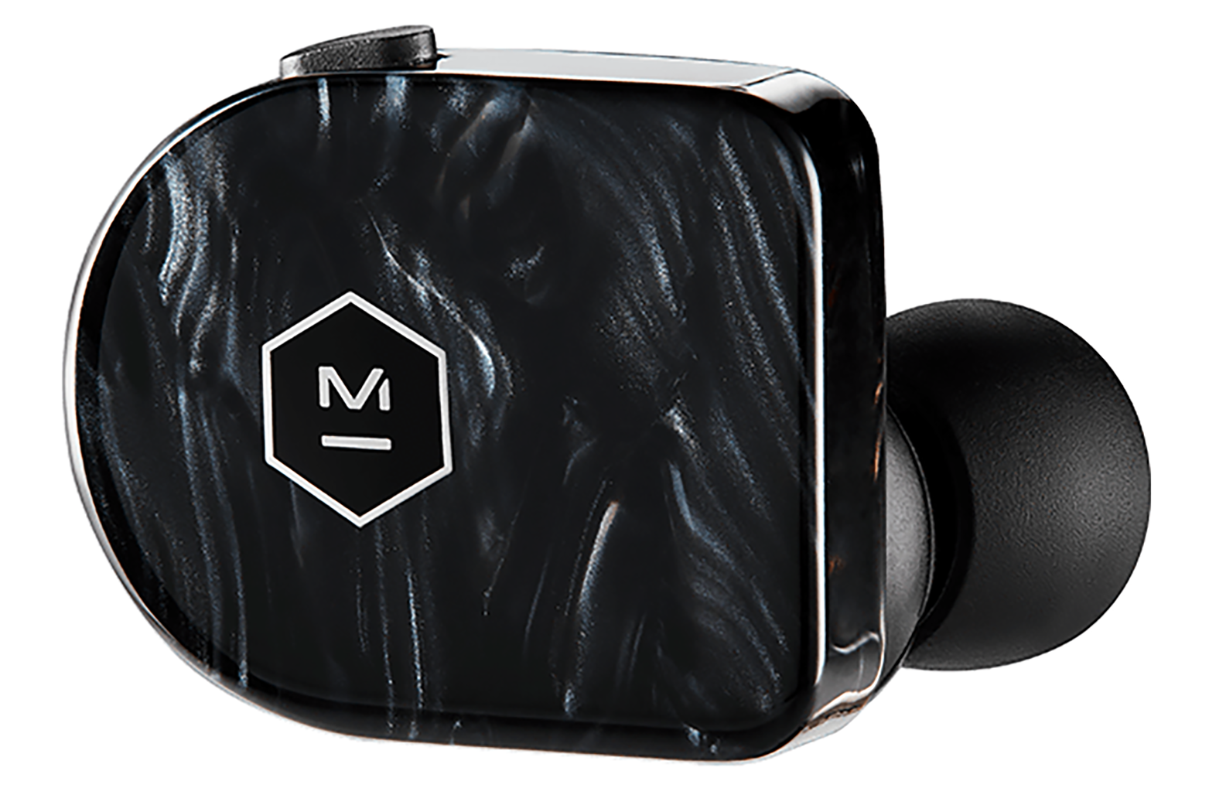
Pros
- Outstanding sound quality
- Bespoke materials and excellent build quality
- USB-C charging
- Control buttons are easy to find and use
- Bluetooth 4.2 – aptX
- Flawless connectivity during testing
Cons
- Battery case is a scratch and fingerprint magnet
- Expensive
When we reviewed the original Master & Dynamic MW07, they had a pretty short battery life. But that didn’t keep us from selecting it as our favorite pair of truly wireless earbuds for audiophiles. Offering excellent aural separation and a surprisingly wide sound stage, the MW07 filled our ears with rich, punchy bass, clear mids, and crisp high-frequency audio. Everything we listened to on them sounded great, and finding a good seal and comfortable fit was achievable for most people.
So when Master & Dynamic launched the MW07 Plus, which extended battery life by hours and added active noise cancelling, that only improved this top pick. If you want to experience all your media to their fullest, this is the pair for you.
6. Anker Soundcore Liberty 3 Pro – Best value
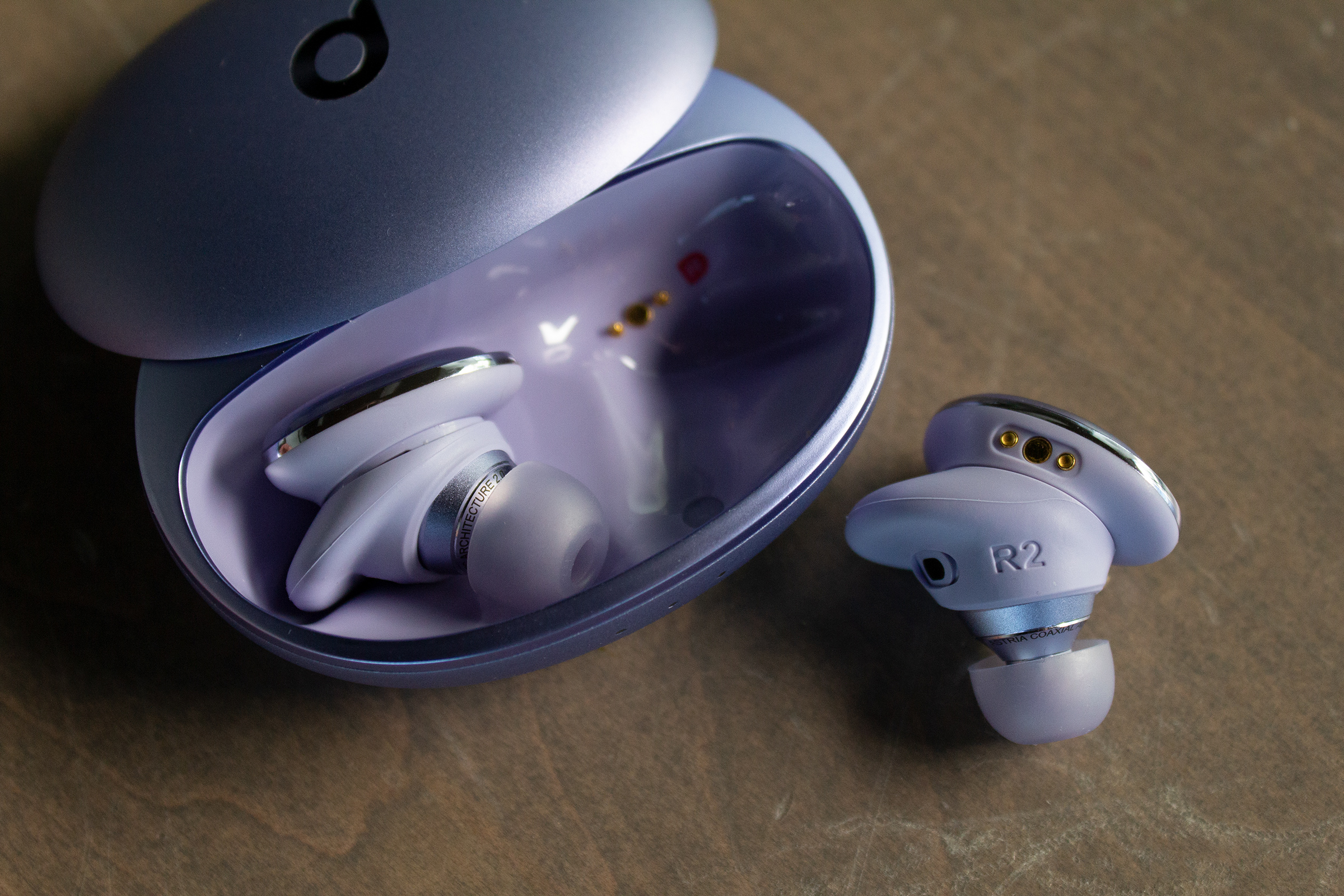
Pros
- Excellent value
- Clean, well-balanced audio
- Good active noise-cancelling
- Highly customizable controls
Cons
- Fiddly controls
- Mediocre multipoint Bluetooth support
- Occasional call drops when switching audio devices
Anker’s Soundcore line of earbuds takes its name seriously. The Liberty 3 Pro in particular offers clean, crisp audio paired with pleasing bass, as well as solid active noise cancelling. And you get all this for $100 less than top-tier buds. Of course, such affordability comes with some sacrifices, but you can work around them easily. You probably won’t even mind doing so, since the Liberty 3 Pro delivers where it counts.
7. Sony WF-1000XM4 – Honorable mention
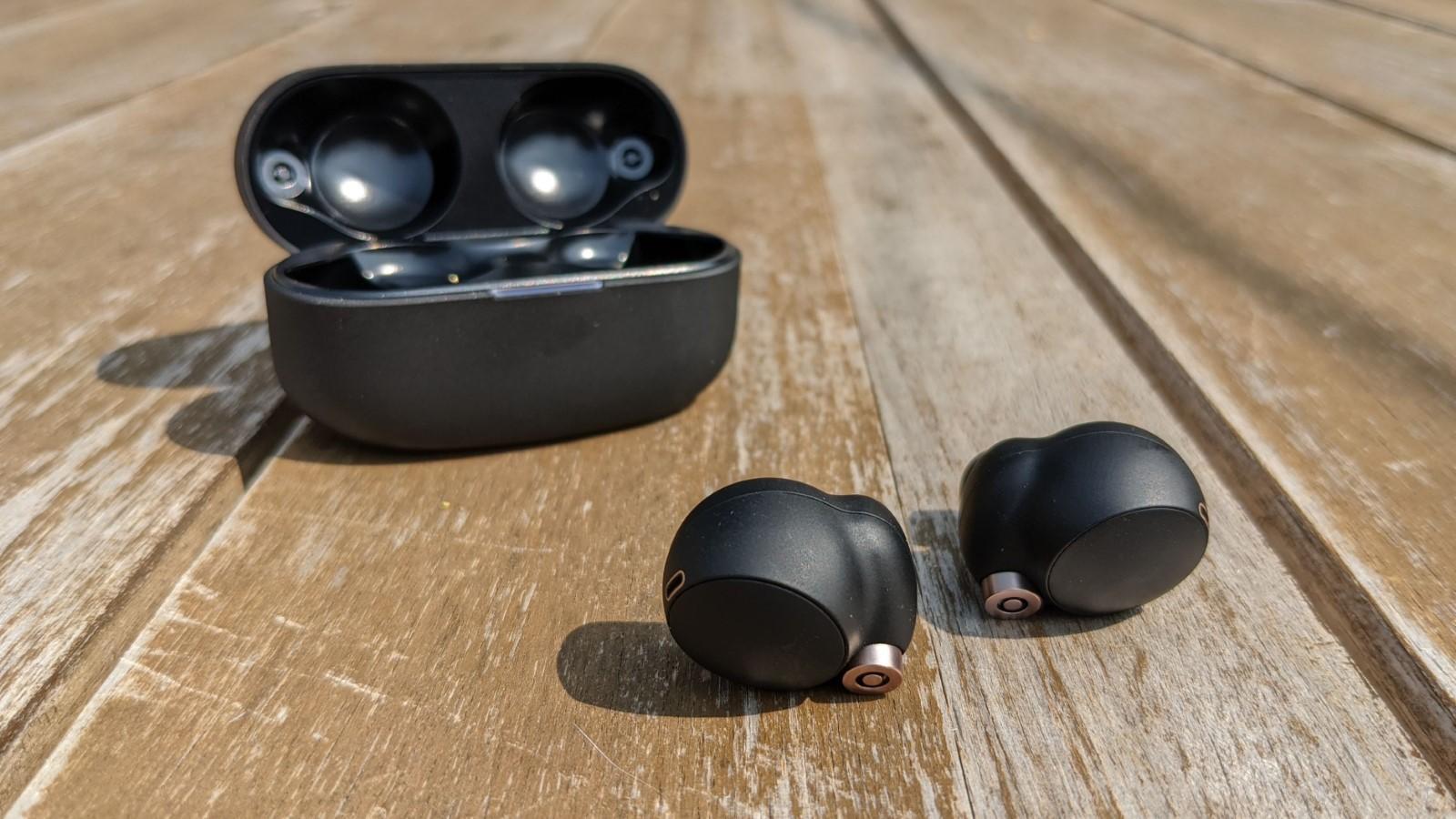
Pros
- Warm, well-balanced sound
- Strong battery life
- Customizable EQ settings
- Compact case
- Decent active noise cancellation
- Easy-to-use app
Cons
- Sensitive touch controls
- Good in-ear seal can be a little difficult
- Ambient sound mode can be disorienting
- Active noise cancellation weak against road noise
The Sony WF-1000XM4’s improvements over the previous generation keep them a top contender among true wireless earbuds with active noise cancelling. They provide warm, well-balanced audio, good battery life, and decent ANC, and Sony’s app makes it easy to adjust sound profiles or level of noise cancelling to your taste.
One of the strongest standout features of the WF-1000XM4 is its compact size. Its charging case slips into the smallest pockets with ease, while still providing multiple charges. Most people looking for a highly portable set of TWS buds with good all-around performance will find these a solid choice.
What to look for in wireless earbuds
Sound
Sounding good is a set of earbuds’ primary purpose. When you invest in a new pair of wireless earbuds, it’s fair to assume that they should make everything sound its best—especially given how much true wireless models cost.
Our sound tests span different genres and feature strong, layered performances. When we play songs, we pay attention to low-, mid-, and high-frequency performance, and whether they provide a broad, rich soundstage. We also listen for any sign of distortion at low or high volumes. We use the earbuds in our daily lives for a minimum of three hours a day over the course of a week or more, making sure to take in at least one TV show or movie. (This allows us to verify how well the audio keeps in sync with the video we see.) Finally, we pay attention to incoming and outgoing call quality, to make sure that we can hear and be heard easily.
Not all earbuds will nail every single category with best-in-class performance. And how well they do is influenced by price—you can’t expect first-class when paying for bottom of the barrel. But in general, you should aim for clear audio playback with good separation, minimal distortion at high volume, and microphone performance that reproduces your voice with accuracy.
Fit
A set of earbuds may sound amazing, but you’ll never know it if they don’t fit well. Well-fitted earphones provide a good seal which, in turn, provides passive noise cancellation (or the muffled hush that falls when you jam in a pair of earphones or earplugs). If you’re in a noisy airport, tuning out your environment is a plus—but for safety reasons, it’s less than ideal if you’re out running. We take this into consideration when evaluating earbuds designed for workouts.
Because no two pairs of ears are identical, we note how many different sizes of interchangeable ear tips each set of earphones comes with. We also pay attention to the inclusion of wings or earhooks, which are important when a more secure fit is needed. If they come with a neckband, we determine whether that band is appropriate for a wide variety of body types. When you’re deciding between true wireless earbuds or wireless earbuds joined by a single cord, these details can make or break your experience depending upon your choice.
Comfort
They might fit and sound great, but if your new true wireless buds hurt your ears, you won’t wear them. We wear the earbuds for at least three hours a day for a week and note if a particular set becomes uncomfortable after a few hours of use.
Connectivity
Wireless earbuds use Bluetooth to connect to your audio device, and to each other in the case of true wireless. Connectivity issues can affect battery life, range, and sound quality. We evaluate for signal interruptions between the earbuds and their audio source, and also note if audio drops from the left or right side during playback.
Features
At minimum, a good pair of wireless earbuds should be able to accept calls as well as play and pause music. If a pair offers additional features beyond the basics, those functions should work well and be easy to use. These days, active noise cancelling is a common inclusion in higher-end buds, though the maximum effectiveness can vary. Also look for good battery life in the buds and from the charging case. Compact charging cases are a plus.
Price
It almost goes without saying that if you pay a premium for earbuds, they should sound spectacular. If a pair of headphones sound great and don’t cost much? Even better. That said, when looking at true wireless earbuds under $100, you won’t get as many features so the focus will be mostly on sound quality. As you move up in price, you should start to expect better sound quality, better battery life, and the inclusion of features like active noise cancelling and customization.
FAQ
What differences should I expect between cheap wireless earbuds and more expensive pairs?
Generally, you’ll find that cheaper models have to pare back in expected areas—sound quality, battery life, noise-cancellation strength, build quality. That’s not to say you can’t find sub-$100 earbuds that sound good, but whenever you do, expect another area to be not as good (e.g., a shorter battery life or weak active noise cancellation).
For most people on a budget (but not a strict one), buds priced around $150 is a good place to start. The best models provide balanced audio with pleasant bass, as well as decent active noise cancellation and at least five to six hours of battery life. Scale up to higher-priced earbuds if you want more audio precision, especially if you’re seeking a very particular sound profile; the best active noise cancellation possible; and the best battery life, both from the buds and their charging case.
If you are on a strict budget? Look at higher-priced older buds that have begun dropping in price, rather than cheap buds with low MSRPs. For example, if your budget is under $100, the Anker Soundcore Liberty 3 Pro has an MSRP of $170 but can sometimes be found on Amazon for under $100. (At the time of this writing, the black and white colors were $85.) You can upgrade your expectations considerably with this approach while still staying in budget.
How will I know I have a good fit with a pair of wireless earbuds?
Unfortunately, the only way to know if a set of buds fits is to try them. You can start with a guess at your ideal ear-tip size based on your physical build, but you may still not end up with your initial expectation. And then to further complicate matters, sizing isn’t standard across brands. You may be a medium ear tip for one brand, but an extra small with another.
When you are trying out earbuds, they should fit snugly enough to form a seal. (An informal way to test this: Speak while they’re in, and see if you hear your voice through bone conductance, i.e., your skull, rather than the normal way.) The tips also should feel comfortable—no unpleasant stretching of your ear canal.
The lack of a good seal will impact sound quality; the most highly reviewed earbuds will sound mediocre (or worse) without one. The lack of a comfortable fit will make you regret your purchase. If you’re striking out on one or both fronts, you can try third-party tips (like from Comply)—but you also may need to consider a different pair of earbuds altogether.
I have trouble with earbuds staying in my ears during vigorous workouts. Will true wireless earbuds work for me?
For the most secure fit, look for wireless earbuds with a hooked ear piece that will loop around the back of your ear. You’ll most commonly find this feature in sports models.
Some general-purpose wireless earbuds offer a middle ground of “wings”—an additional piece of rubber attached to the bud that nestles against a ridge of your outer ear (the one nearest your ear canal). These won’t always work for extra intense movement, but they can help.


